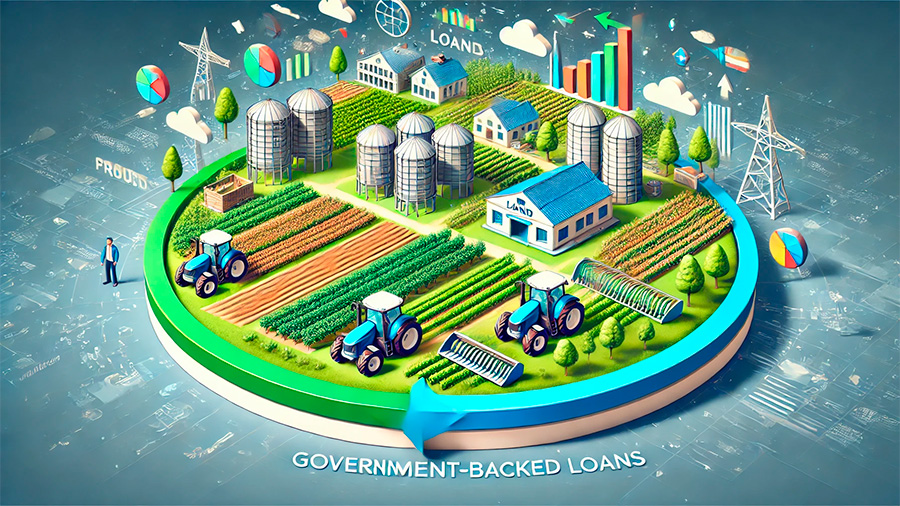
Financial Growth for Farms: Unlocking Opportunities with Government Loans
Access to capital is crucial for agro-enterprises looking to expand their operations, increase production, and reach new markets. However, many agricultural businesses face challenges when trying to secure traditional loans due to the inherent risks and uncertainties in the farming industry. Government-backed loans have emerged as a vital tool for supporting the growth of agro-enterprises, providing them with the financial resources needed to invest in new technologies, modernize infrastructure, and expand their market reach. These loans not only help businesses grow but also strengthen the agricultural sector by fostering innovation and sustainability.
This article explores how government-backed loans are enabling agro-enterprises to scale their operations, improve productivity, and access new markets.
The Role of Government-Backed Loans in Agro-Enterprise Growth
Government-backed loans offer agro-enterprises a way to access capital at more favorable terms than traditional lending options. By providing guarantees or direct lending, government programs reduce the risk for lenders, making it easier for agro-businesses to secure the financing they need. These loans are typically designed to support investments in modern agricultural practices, infrastructure, and sustainability initiatives, ensuring that businesses can adapt to changing market demands and environmental conditions.
1. Expanding Access to Affordable Credit
One of the most significant benefits of government-backed loans is that they make credit more affordable for agro-enterprises. These loans often come with lower interest rates, longer repayment terms, and reduced collateral requirements compared to conventional loans. This makes it easier for farmers and agricultural businesses to borrow the funds they need to purchase equipment, upgrade facilities, or invest in technology without being burdened by high-interest rates or short repayment periods.
How government-backed loans improve credit access:
- Lower interest rates: Government-backed loans offer more favorable rates, reducing the overall cost of borrowing for agro-enterprises.
- Flexible repayment terms: Longer repayment periods allow businesses to spread out their loan payments, making them more manageable.
2. Reducing Lender Risk
Government-backed loans reduce the risk for lenders by providing guarantees on the loans, ensuring that the lender will be repaid even if the borrower defaults. This encourages banks and financial institutions to lend to agro-enterprises that may be considered higher risk due to the volatility of the agricultural industry. By mitigating this risk, government-backed loans open up new opportunities for businesses to access the capital they need for expansion.
How government loan guarantees reduce lender risk:
- Loan guarantees: The government assumes a portion of the risk, giving lenders more confidence to approve loans for agro-enterprises.
- Increased loan approvals: Reduced risk leads to higher approval rates for agro-enterprises, enabling more businesses to secure financing.

How Government-Backed Loans Drive Production Expansion
Access to capital through government-backed loans allows agro-enterprises to expand their production capabilities, whether by purchasing new equipment, expanding acreage, or modernizing their operations. This increased capacity helps businesses meet growing market demand, improve efficiency, and increase profitability. As production expands, agro-enterprises are better positioned to supply both domestic and international markets, contributing to the overall growth of the agricultural sector.
1. Investment in Modern Equipment and Technology
Government-backed loans enable agro-enterprises to invest in modern equipment and agrotechnology, which are essential for improving productivity and reducing operational costs. Precision farming tools, automated machinery, and advanced irrigation systems can all be acquired with the help of government-supported financing. These technologies help farmers optimize resource use, increase yields, and reduce labor costs, making their operations more efficient and profitable.
Benefits of investing in modern agricultural equipment:
- Increased efficiency: Modern equipment allows farmers to streamline their operations, leading to higher productivity with fewer resources.
- Cost savings: Automation and precision farming technologies reduce labor and input costs, improving overall profitability.
2. Infrastructure Expansion and Modernization
Access to government-backed loans also allows agro-enterprises to invest in the expansion and modernization of their infrastructure. Whether it’s building new storage facilities, upgrading transportation systems, or enhancing on-site processing capabilities, these improvements help businesses increase their production capacity and reduce post-harvest losses. Modern infrastructure is essential for maintaining product quality, ensuring timely delivery to markets, and minimizing waste.
How infrastructure improvements benefit agro-enterprises:
- Enhanced storage capacity: Expanding storage facilities allows businesses to store larger quantities of produce, reducing the risk of spoilage and ensuring a stable supply to markets.
- Improved logistics: Modern transportation and logistics systems help agro-enterprises reach new markets more efficiently, increasing their competitive advantage.

Reaching New Markets with Government-Backed Loans
In addition to expanding production, government-backed loans provide agro-enterprises with the financial resources needed to enter new markets. Whether targeting regional, national, or international markets, access to capital helps businesses develop new distribution channels, meet market standards, and scale their operations. Government-backed loans are often tied to programs that promote export growth and market diversification, giving agro-enterprises the tools they need to succeed in competitive global markets.
1. Scaling Operations for Market Expansion
With the financial support of government-backed loans, agro-enterprises can scale their operations to meet the demands of new markets. This might involve increasing production capacity, developing new product lines, or enhancing packaging and processing to meet the specific requirements of different markets. Scaling operations allows businesses to expand their market presence and increase their revenue streams.
How scaling operations helps reach new markets:
- Increased production capacity: By expanding production, agro-enterprises can meet the demands of larger and more diverse markets.
- Product diversification: Developing new products or adapting existing ones for different markets can help businesses gain a foothold in new regions.
2. Meeting Market Standards and Certifications
Government-backed loans also help agro-enterprises meet the regulatory standards and certifications required to enter new markets, particularly in international trade. Many countries have strict standards for food safety, quality control, and sustainability practices. By using government-backed loans to invest in compliance, agro-enterprises can ensure they meet these requirements, opening the door to lucrative export markets.
Importance of meeting market standards:
- Access to export markets: Meeting international standards enables agro-enterprises to sell their products in global markets, increasing their sales opportunities.
- Improved reputation: Certifications related to sustainability, organic farming, or food safety enhance the reputation of agro-enterprises, making them more attractive to buyers.
Sustainability and Innovation Supported by Government-Backed Loans
Sustainability and innovation are increasingly important in the agricultural sector, and government-backed loans are helping agro-enterprises adopt more sustainable practices and embrace new innovations. These loans support investments in renewable energy, water conservation technologies, and sustainable farming methods, all of which contribute to the long-term viability of agro-enterprises and the health of the environment.
1. Investment in Renewable Energy
Many government-backed loan programs provide incentives for agro-enterprises to invest in renewable energy sources, such as solar panels, wind turbines, and biogas systems. These investments not only reduce energy costs but also decrease the environmental impact of agricultural operations. By adopting renewable energy, agro-enterprises can improve their sustainability while enhancing their long-term profitability.
Benefits of renewable energy for agro-enterprises:
- Lower energy costs: Renewable energy systems reduce reliance on fossil fuels, lowering operational expenses for agro-enterprises.
- Environmental sustainability: Using renewable energy helps agro-enterprises reduce their carbon footprint and contribute to global sustainability goals.
2. Promoting Sustainable Farming Practices
Government-backed loans also support the adoption of sustainable farming practices, such as crop rotation, organic farming, and water conservation techniques. These practices not only help preserve the environment but also improve soil health and crop yields over the long term. By providing financial assistance for sustainable practices, government-backed loans encourage agro-enterprises to prioritize environmental stewardship while maintaining profitability.
How sustainable farming improves agro-enterprises:
- Improved soil health: Sustainable practices enhance soil fertility, leading to better crop yields and reduced dependence on chemical fertilizers.
- Long-term profitability: By reducing environmental degradation, sustainable farming practices ensure that agro-enterprises can continue producing at high levels for years to come.
Conclusion
Government-backed loans are playing a critical role in the expansion and modernization of agro-enterprises by providing affordable access to capital. These loans enable businesses to invest in new technologies, improve infrastructure, scale operations, and enter new markets. By supporting both growth and sustainability, government-backed loans are helping agro-enterprises thrive in an increasingly competitive and environmentally conscious agricultural sector. For agro-enterprises looking to expand their production and reach new markets, government-backed loans offer a path to success.
